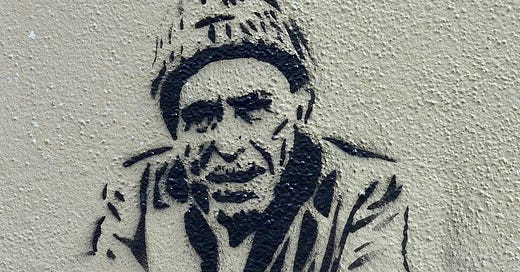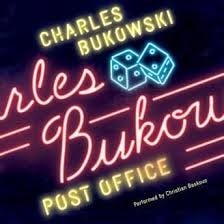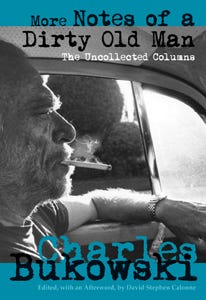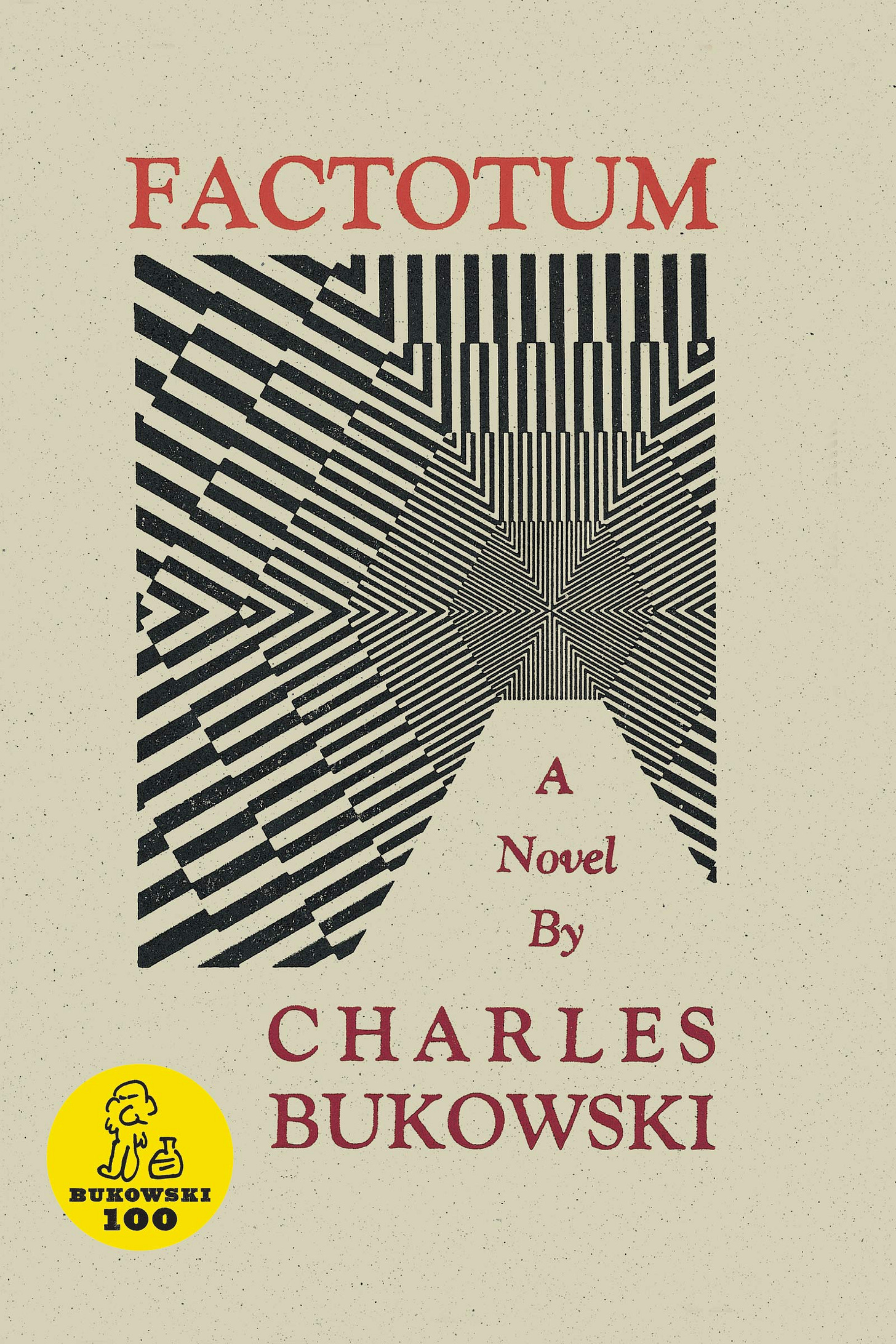
For true blue Progressives as well as for average people who just want government to work, this past 12 month period constitutes what I call a Charles Bukowski* kind of year. Let me briefly recap three of his novels and make my political point at the end.
Post Office
Bukowski’s first novel was Post Office. It introduces Henry Chinaski, a first-person alter ego for Bukowski. Chinaski is always a paycheck away from homelessness. He gets a job with the Post Office and works there 11 years. Initially, he works as a sub on mail routes, and he hates that job because his supervisor is an ass who gives him difficult routes. On one occasion, he delivers mail to a Catholic Church. He's supposed to go to the parish house but ends up in the church itself and finds a room where the priests prepare. It has toilets and showers. His reaction: "I'll know where to shit and shower when I'm down and out."
Chinaski doesn't get along with any authority. He's constantly being written up, but he doesn't care. At one point he resigns but goes back right away. On another occasion he pretends to be sick for several days to skip work. He takes leave so he can play the ponies at the track. He also doesn't get along with women for very long. At the beginning of the novel, he's with a woman named Betty, and they have a dog together. She accuses Chinaski of sleeping with two women in the neighborhood. She was right, but he denied it. She throws him out on the street. He says, "I just lost three women and a dog." Then, when he's with his next woman, whose name was Joyce, he's driven crazy by her parakeets, so he releases them. Initially, the birds didn't want to leave the cage. He says, "Humans, birds, everything has to make these decisions."
Chinaski's life is whacky, and he hates his job. He meets Mary Lou at the track and thinks she's wonderful. But then Mary Lou and her boyfriend try to rob him. He meets a woman named Fay and they have a daughter together, but then Fay leaves with the girl. He meets up with a guy named Moto with whom he first started at the Post Office. Moto is now a supervisor. "I've got four kids," says Moto to explain his descent into bureaucratic responsibility. At the end of the novel, Chinaski retires so he can write a book. "After living in the cage," he says, "I had taken the opening and flown out."
More Notes of a Dirty Old Man
I bought More Notes of a Dirty Old Man at the City Lights bookstore in San Francisco. I enjoyed most of the pieces in this rambling, disjointed collection of his columns in the Los Angeles Free Times, Open City, and High Times. I'll skip the boring bits—there were a few—and concentrate on some of his relevant insights and shocking thoughts.
He writes about how men and women are lonely and looking for connection while at the same time they are "working these dull soul-sucking jobs that twist their faces like rotten lemons and pinch their spirits, out, out, out." At the end, he writes "The madhouses crawl with sexually maladjusted and occupationally-destroyed people . . . Answers? Who knows? We're structured in. The bars are heavy." Indeed. This section really captures our collective cynicism about life in America today. So many people trapped, so much ugliness, so much structured brutality that people are barely surviving.
Bukowski tugs at my introversion with his stance regarding other people. He writes: "I know that I am supposed to love my fellow man but I don't. I don't hate him; I often dislike him; I just don't want him about. I feel better alone." And then he writes "I loved solitude. Still do. I grow when I am alone." But introversion gets in the way of political action. It’s like the funny meme that says “Introverts Unite! We’re here, we’re uncomfortable, and we want to go home.”
And then, of course, there is the "dirty old man" of the title. Bukowski was a degenerate. No doubt. He earned his degeneracy with every drink, every woman sleeping in his filthy bed, every eviction, and every lost bet at the track. The tales of his degeneracy are legion. On one occasion, he admits that "I was like any other dreamer--I wanted to die while being sucked off by the 15-year-old neighbor girl while her parents were at mass." Oh my God! To think like that is revolting enough, but to put it down for publication is something else.
Factotum
Factotum is another semi-autobiographical novel featuring Henry Chinaski, an itinerant man who boozes and gambles his way from one job and one woman to another. The novel takes place at the tail end of World War II. Chinaski sat out the war because a psychologist deemed him unfit for military service. There's no discernible plot other than the constant sequence of new jobs and women, interspersed with bus rides, drunken binges, and visits to the racetrack. Still, with short chapters focused on particular anecdotes, the novel pulls the reader along for the ride through the seedier sides of Los Angeles, New York, Miami, and other towns.
Whether he's masturbating to the sexy wife across the street or losing a job in a warehouse because of his three-hour liquid lunches at the local bar, Chinaski evinces a complete disregard for social conventions and norms of behavior. He's a man driven by basic needs, and he can only conform to the wishes of society long enough to get a little money to satisfy those needs. Beyond that, he can't be bothered to care about what other people think or about what society expects. "Frankly," he comments at one point, "I was horrified by life, at what a man had to do simply in order to eat, sleep, and keep himself clothed."
Chinask leaves home and wanders the country taking unskilled jobs in warehouses and whatnot, hooking up with various women, and commenting on life and love. His alienation is palpable, but he doesn't seem to mind it. "Love is for real people," he says at one point. On another occasion he strikes one as the only sane person in the country: "How in the hell could a man enjoy being awakened at 6:30 a.m. by an alarm clock, leap out of bed, dress, force-feed, shit, piss, brush teeth and hair, and fight traffic to get to a place where essentially you made lots of money for somebody else and were asked to be grateful for the opportunity to do so?"
Reading Bukowski is more liberating and escapist than reading any thriller or crime novel. In Factotum’s spare prose and dialogue, we encounter the denizens of America--from Helen, with her “suction pump for a pussy,” to Manny, whose "ambition is handicapped by laziness." From the auto parts manager who rips off people by marketing and selling three levels of brake pads that are identical, to Chinaski himself, who fucks "better as a bum than as a puncher of timeclocks." Bukowski is a one-man band playing a tune that clashes with the American anthem of staid, efficient capitalism and Christian morality. I'm thankful that he lived and drank and fucked and wrote it all down.
A Charles Bukowski Kind of Year
This past year in politics has been awful in so many ways. The near-term future will continue to be awful until we can turn the tide. As Republican policies hit, more of our fellow Americans are going to be down and out, living like Henry Chinaski. We need to understand that, show compassion, and advocate for demand-side policies that will help them and stimulate the economy. Still others will be persecuted and pursued as the Trump administration institutes a tiered system of “illegals,” precarious citizenship for those who have been naturalized, and full citizenship for the most privileged. Even the citizenship protections of the 14th Amendment might not be safe from this administration and its Supreme Court appointees.
There’s a strong pull in this year of Charles Bukowski towards disconnection. When things are this bad, why not just turn inward? I get it. Bukowski himself was not a fan of democracy because democracies are made up of the very people he distrusted. There’s a lot of comfort in drinking and fucking and insulating oneself from the consequences of MAGA policies as they devastate others. I say go for it. Protect yourself. Distract yourself at times. We’re going to need that. But let’s be clear about our priorities. Our tendency to selfishly turn inward is an individual self-defense mechanism, but we can simultaneously activate our collective self-defense mechanisms. We must turn outward. We must turn towards each other. We must fight with our ballots and with our voices.
Like Bukowski and his alter-ego Henry Chinaski, who never hesitated to speak their minds, none of us can suffer MAGA fools anymore. While Bukowski loved to shock with his dark thoughts and debauchery, we can shock our fellow citizens with brutally accurate descriptions of what we see in Trump’s America. Bukowski referred to his typewriter as his machine gun, and suggested that if he left it, the rats would come pouring into the world. We must speak and write plainly, letting the pieces fall where they may. We’ll never convince the hardcore Trumpists, but here’s the thing: we don’t need to. Plenty of people who voted for Trump in 2024 simply made a mistake. By speaking and writing about how Republican policies are destroying lives, wrecking the economy, trampling precious liberties, and destabilizing institutions on which we depend, we can bring those people back to our side. Let them join us in the bar, where together we can laugh and shake our heads at our mistakes. Perhaps they’ll regret voting for MAGA, while we’ll regret bedding the wrong partner back in the day.
Let’s all channel our inner Bukowski and resist the fuck out of this regime!
*Yes, I know Bukowski has been accused of misogyny. Martin Luther King, Jr. was allegedly an adulterer and physically abusive to women. Margaret Sanger benefited from an alliance with eugenicists and expressed deplorable views on the subject. Most people are complicated, with exemplary and despicable qualities mixed together. Let’s not lose the thread by being absolutist about people from whom we can draw inspiration and wisdom.






